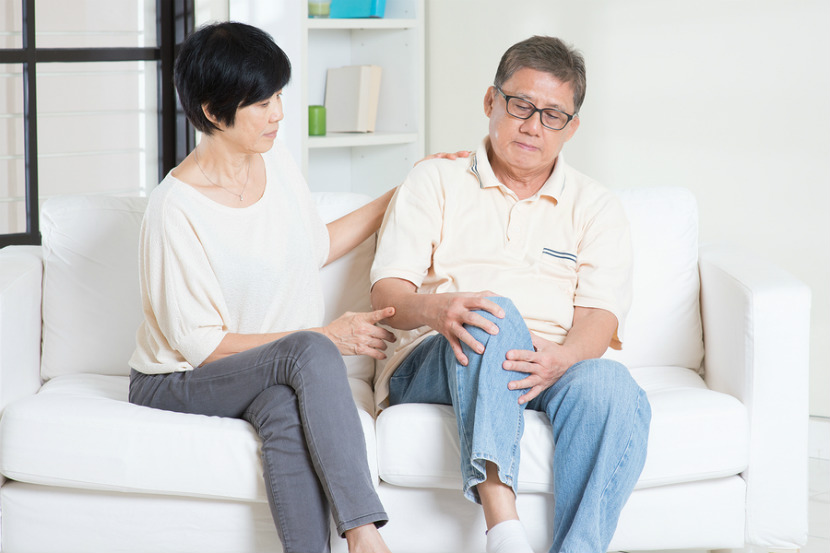
Osteoarthritis is the most common type of arthritis. Older adults often get osteoarthritis, especially if they are overweight. There are many helpful things you can do to ease the pain of osteoarthritis. Read on for some helpful advice.
What is osteoarthritis?
Osteoarthritis is a type of arthritis that affects the cartilage that cushions your bones at the joints. Cartilage helps your bones glide over one another. If cartilage breaks down, the bones rub together. Osteoarthritis is a chronic (long lasting) condition.
What are the symptoms of osteoarthritis?
Osteoarthritis causes pain and stiffness in the joints. Osteoarthritis is often worst in the knees, hips and small hand joints. In most cases, the exact cause of osteoarthritis is not known.
Who is at risk of getting osteoarthritis?
-
Women and men can both get osteoarthritis.
-
Being overweight increases the risk of getting osteoarthritis. This happens because extra weight causes more wear and tear on the cartilage and joints.
-
There are more cases of osteoarthritis in men who are younger than 45, while women tend to get it when they are 55 or older.
-
Osteoarthritis can also occur due to repeated joint stress from certain physical jobs or sports.
-
Osteoarthritis is genetic. That means you are more likely to get osteoarthritis if a family member also has it.
How can I manage osteoarthritis?
Osteoarthritis cannot be cured. The good news is that you can manage your symptoms.
Physical Activity and osteoarthritis
Start by being active. Physical activity is an important treatment, regardless of your age or level of pain. It can help:
-
Reduce pain
-
Maintain and improve joint movement
-
Improve physical function
-
Help you lose weight if you are overweight
Swimming is a good option since it puts no pressure on your joints. Activities that strengthen your muscles, such as weight lifting, are also important. Speak to your doctor or see a physical therapist before starting a physical activity program.
Weight management and osteoarthritis
Studies show that weight loss may help improve physical function for overweight or obese adults with osteoarthritis. Weight loss may also help ease pain. Click here to read about weight control strategies that work.
Other treatments for osteoarthritis
-
Some people find acupuncture, physical therapy or massage to be helpful.
-
Applying heat and cold may also provide some pain relief.
-
Severe cases of osteoarthritis may need surgery to replace or repair damaged joints.
Does a balanced diet help osteoarthritis?
Healthy eating may help reduce the symptoms of different types of arthritis. Here are five healthy eating strategies:
1. Enjoy a wide variety of foods based on Canada’s Food Guide. This will provide the right balance of nutrients that your body needs.
2. Eat 7 to 10 servings of vegetables and fruits each day. Pick lots of bright orange and green options, such as broccoli, cantaloupe and carrots. They are high in antioxidants, which may reduce inflammation, decrease cartilage breakdown and slow the progress of osteoarthritis.
3. Choose more whole grains such as brown rice, barley and oats. They have more antioxidants than refined grains, such as white bread and white rice.
4. Choose more unsaturated fats like canola and olive oil, nuts like walnuts and almonds and fish like salmon.
5. Choose fewer foods made with saturated and trans fat like butter, lard, cream, baked goods and fried foods.
Are there medicines that can help osteoarthritis?
Yes. Medicine can be used to reduce pain from osteoarthritis. Talk with your doctor about which medicines may be right for you. Your doctor may recommend:
-
Pain relievers such as acetaminophen
-
Anti-inflammatory drugs such as aspirin or ibuprofen if your pain continues
-
Corticosteroids injected right into the joint to reduce swelling and pain
Speak to your health professional before starting any medicines for osteoarthritis so that he/she can help you pick what is right for you.
Are there supplements that can help osteoarthritis?
Two supplements called glucosamine and chondroitin are thought to be helpful for osteoarthritis. However, they are not currently licensed for use as drugs to treat osteoarthritis because research does not show that they are effective. If you choose to try these products, make sure you buy ones that have a Natural Product Number (NPN). This means they are licensed with the Natural Health Products Directorate in Canada. Speak to your health professional before starting any supplements so that he/she can help you pick what is right for you.
Bottom line
If you have osteoarthritis, be active, enjoy a healthy eating plan and maintain a healthy weight. This can help ease the pain in your joints. Speak to your doctor before taking medicine for osteoarthritis.
Last Update – January 30, 2019